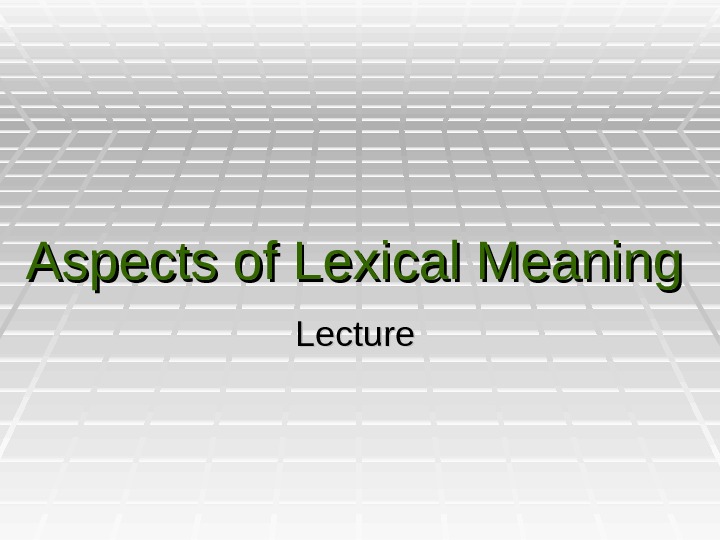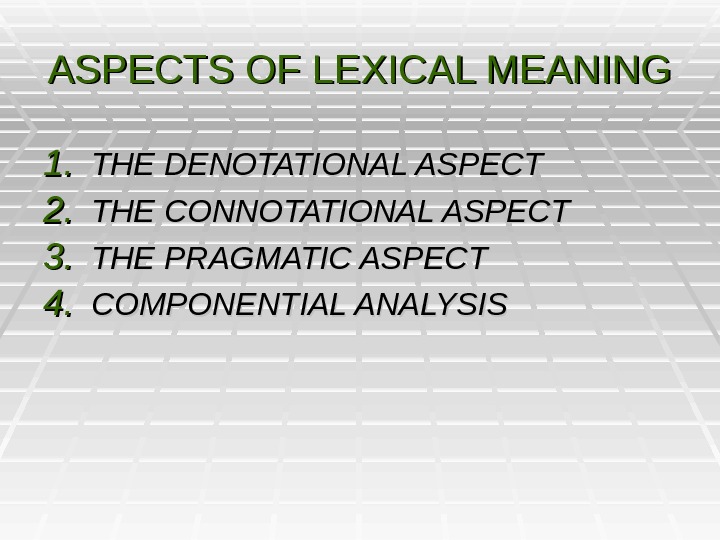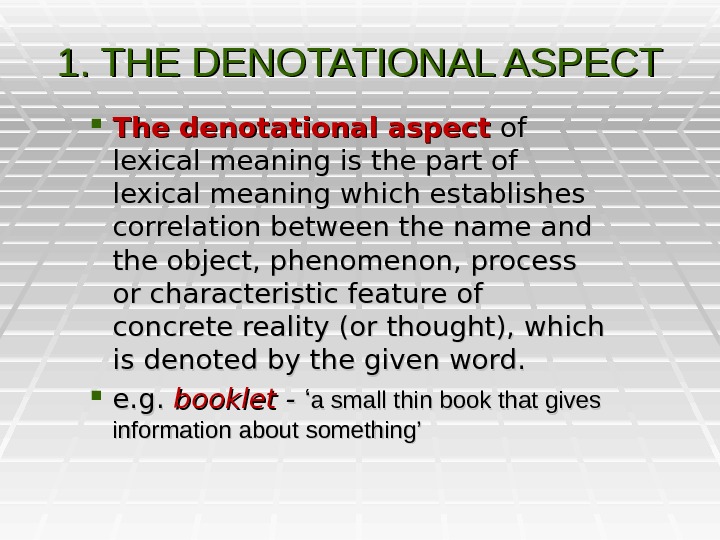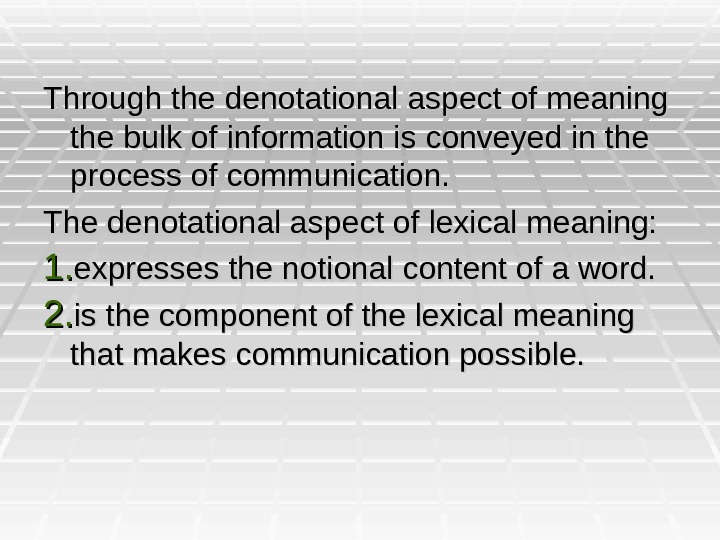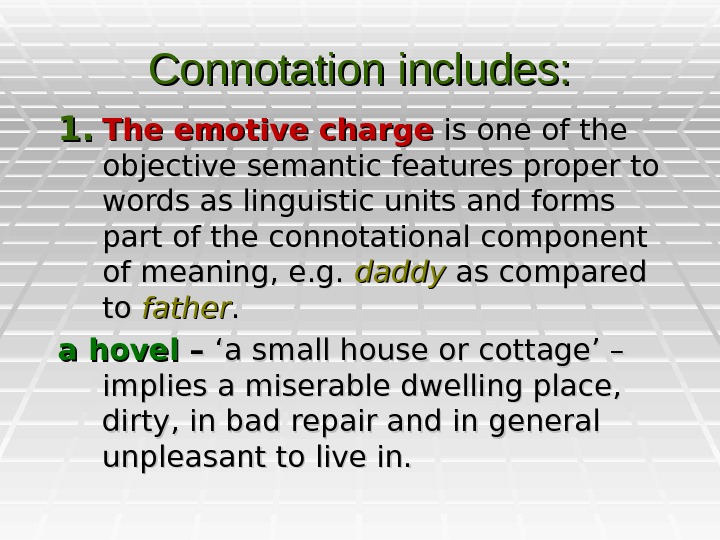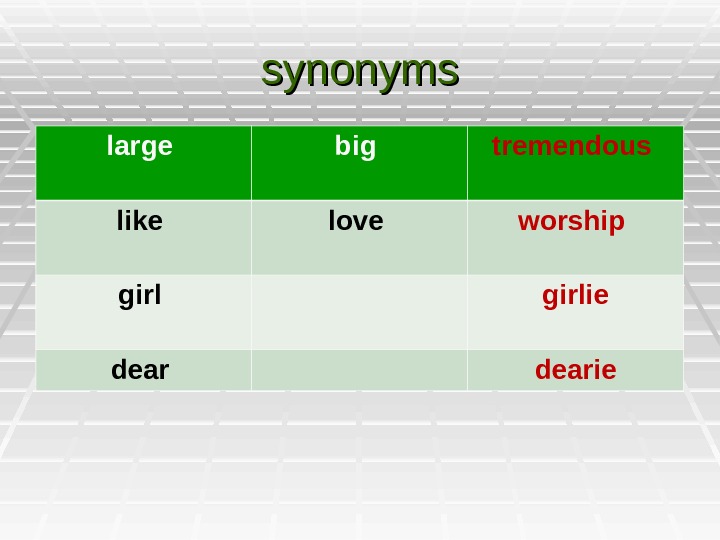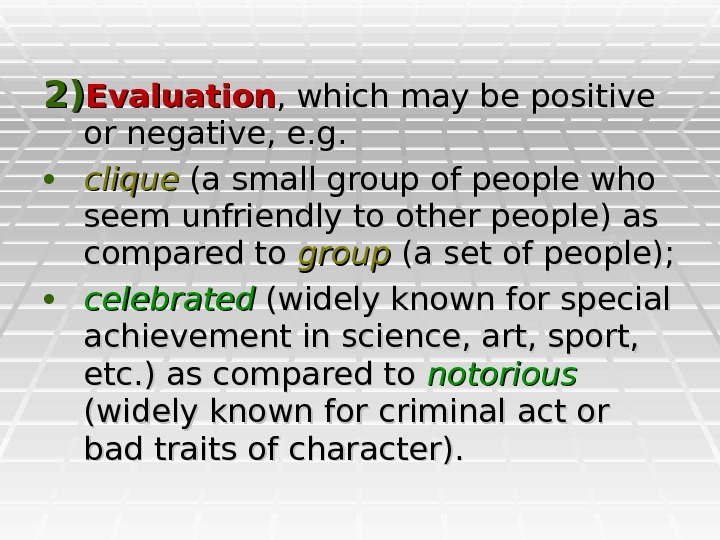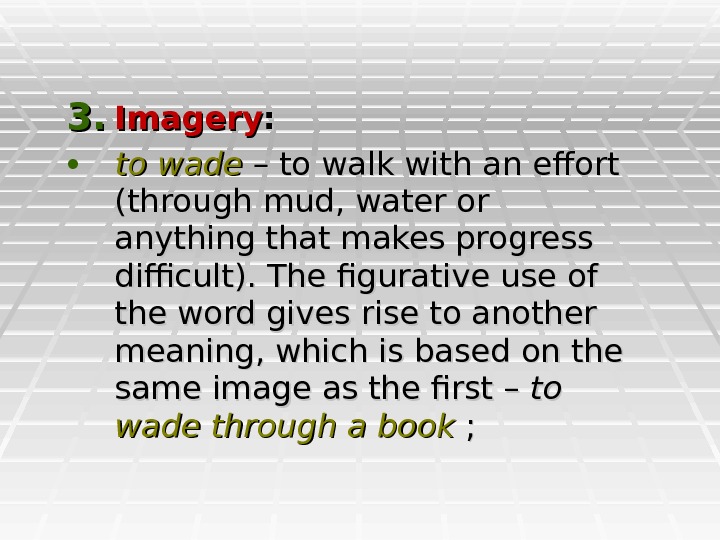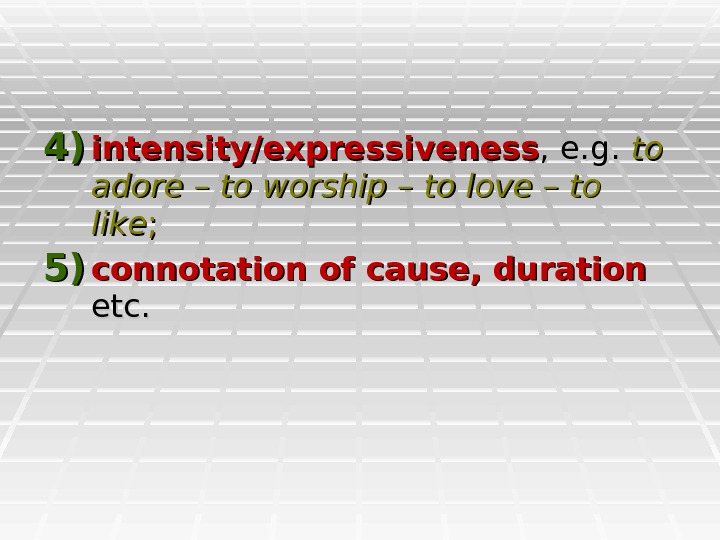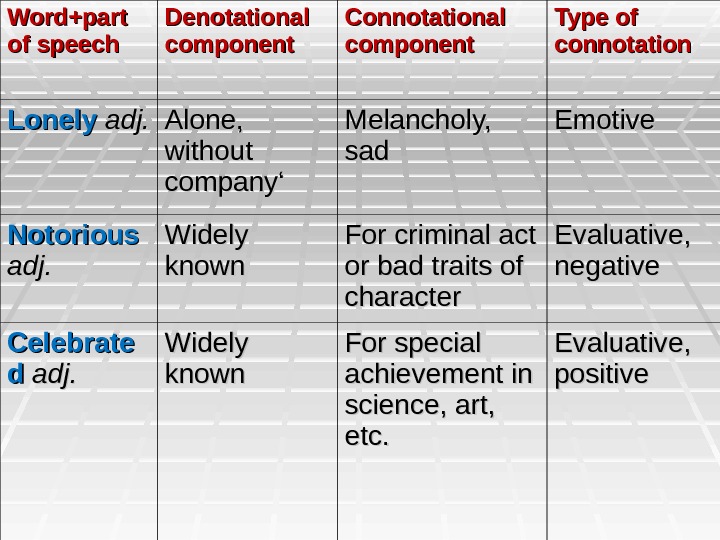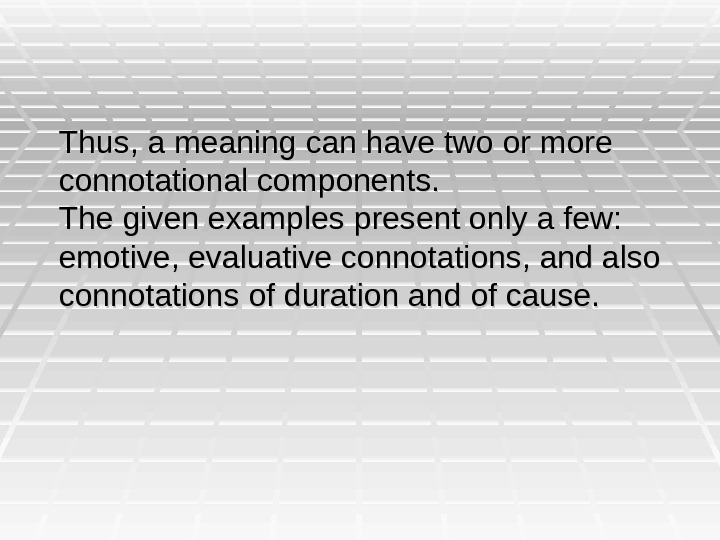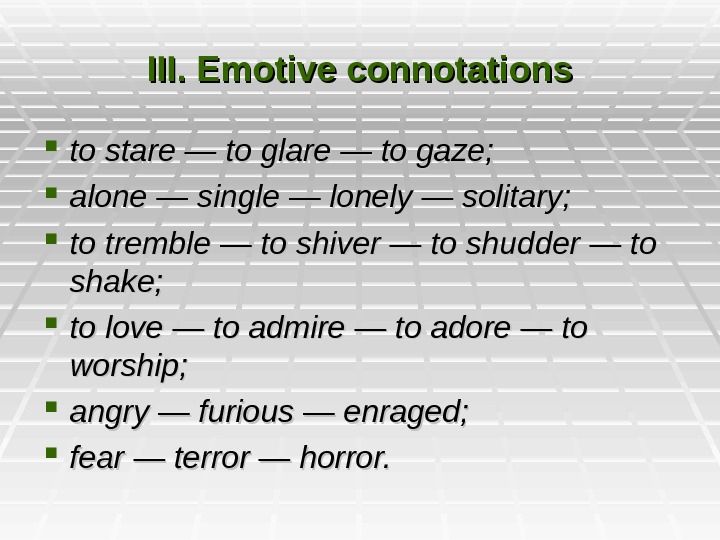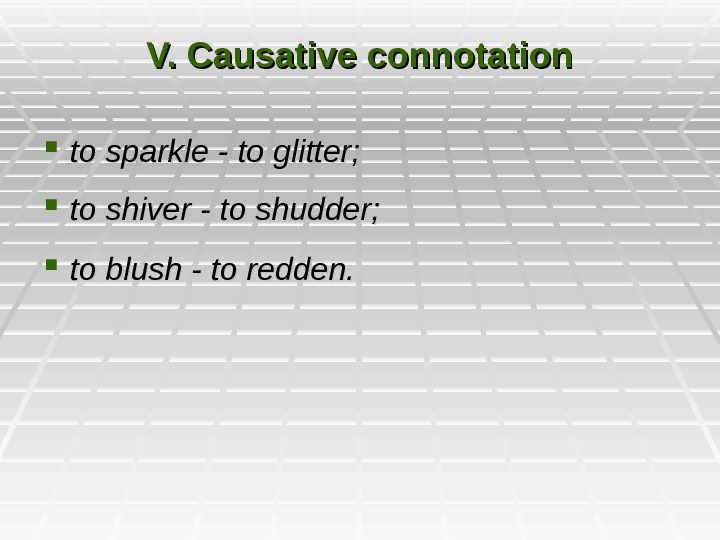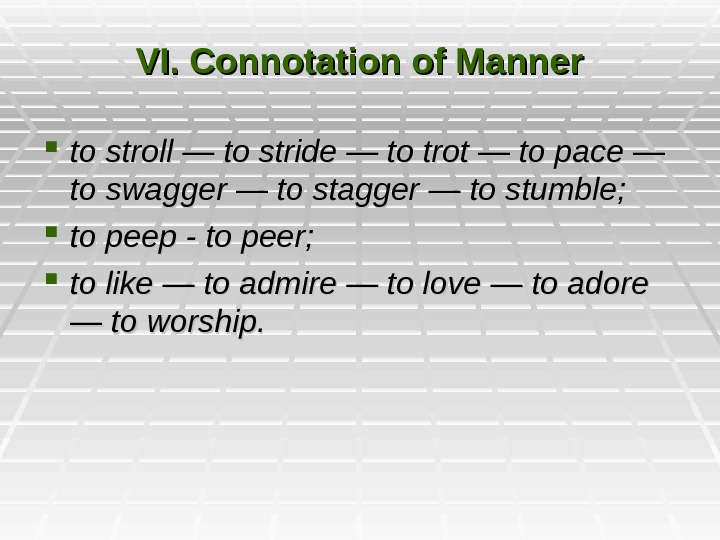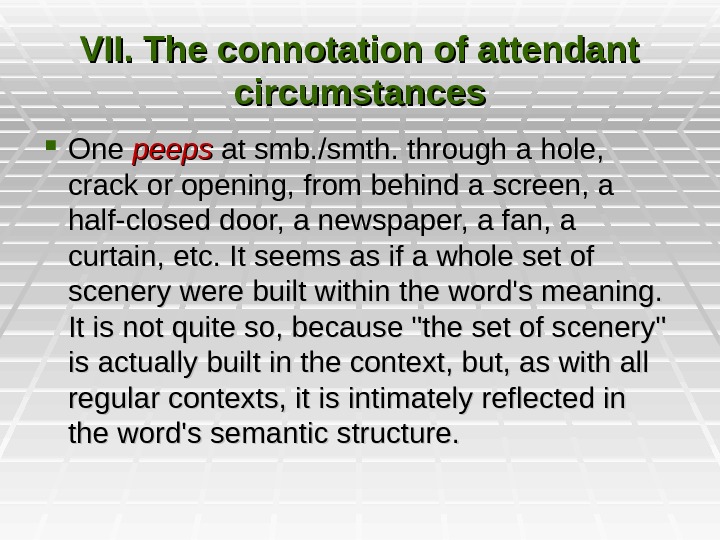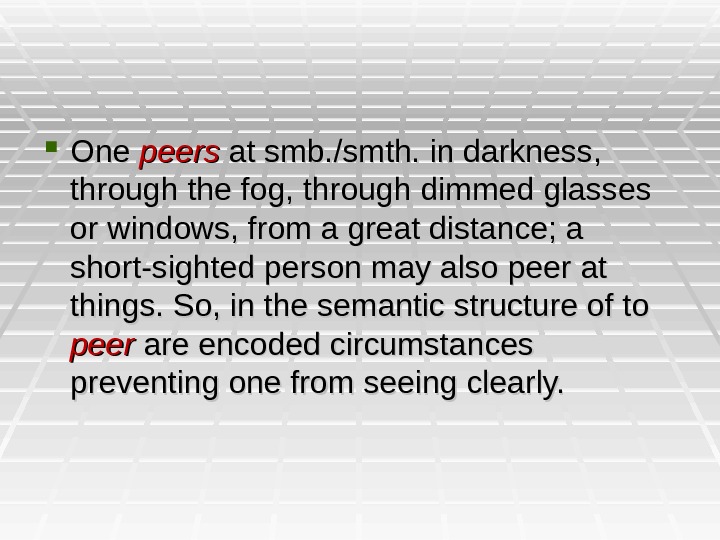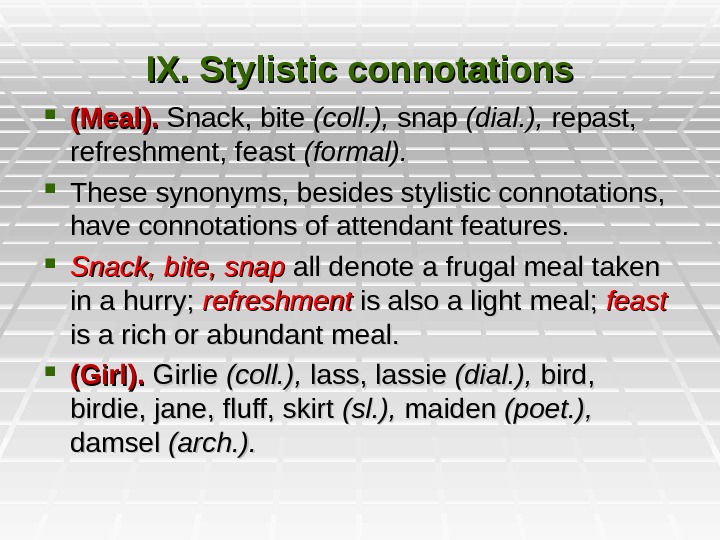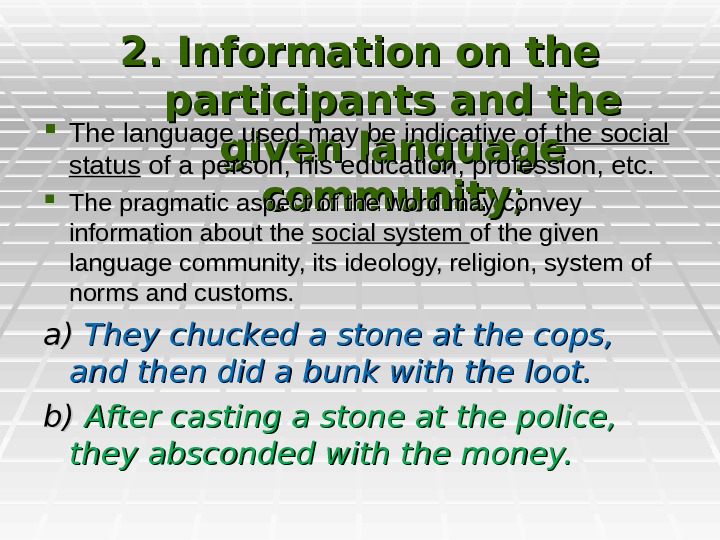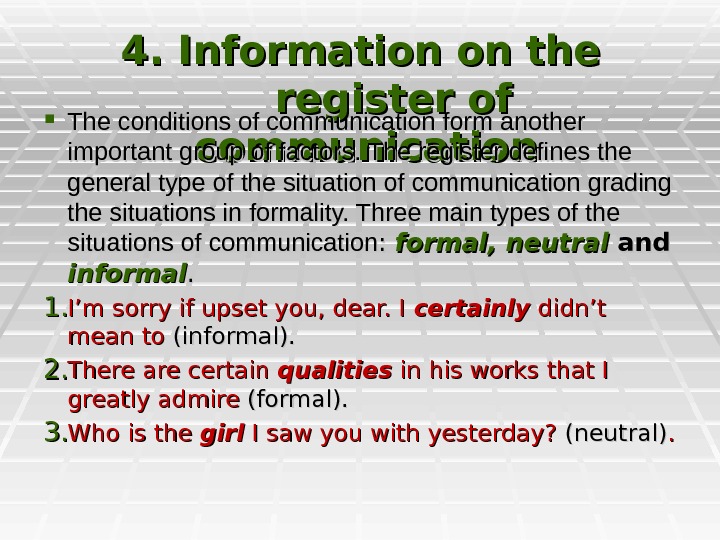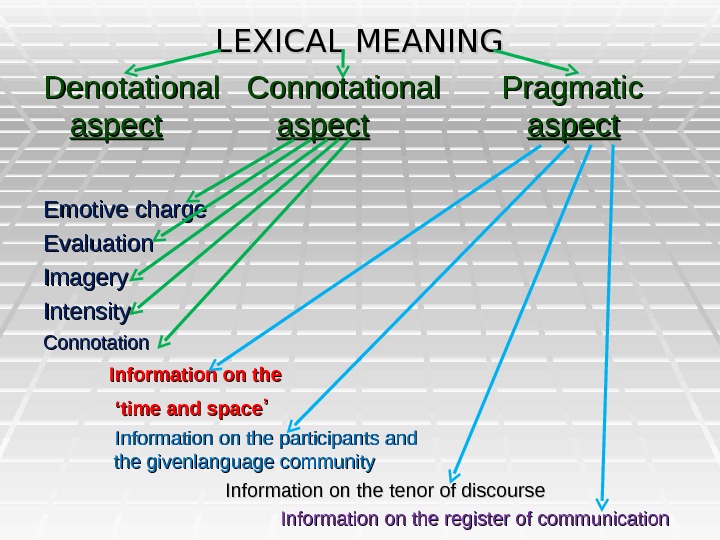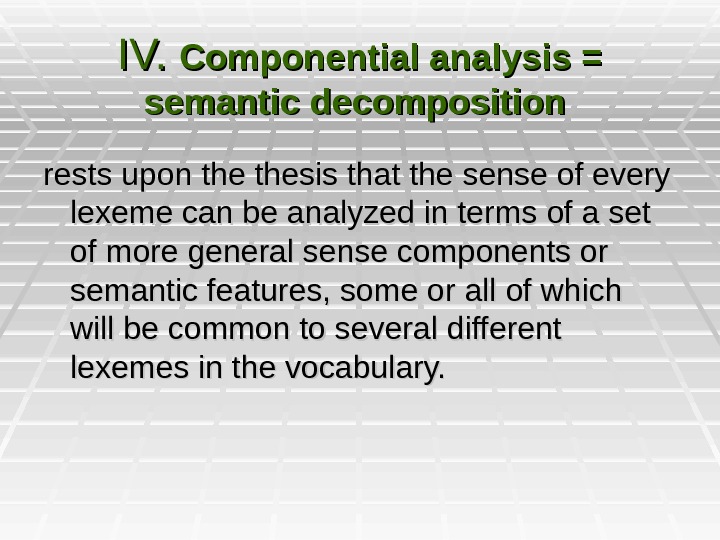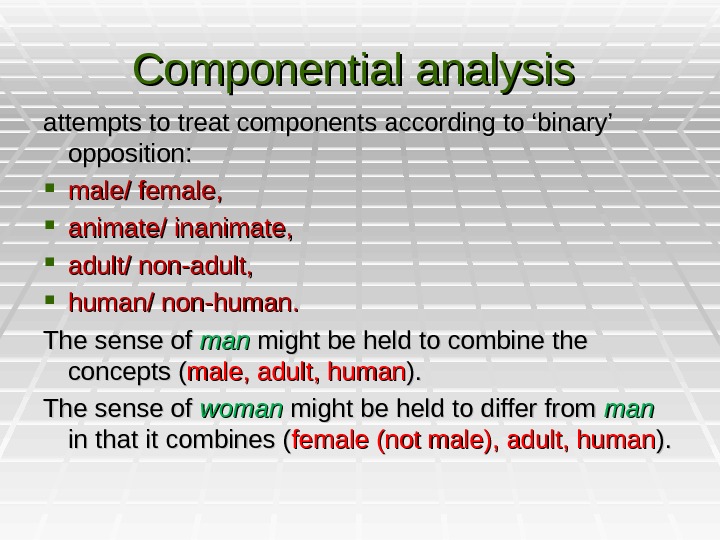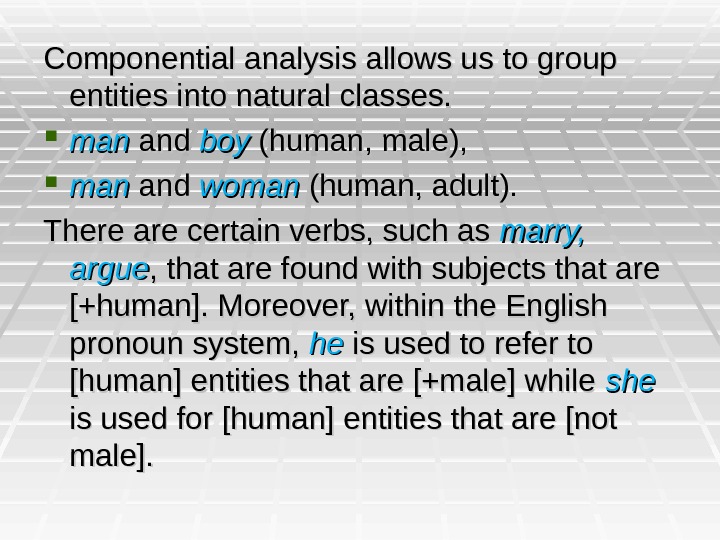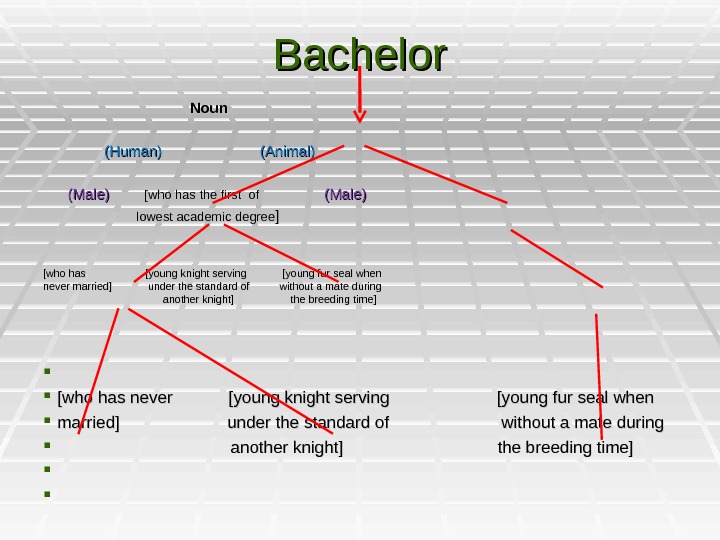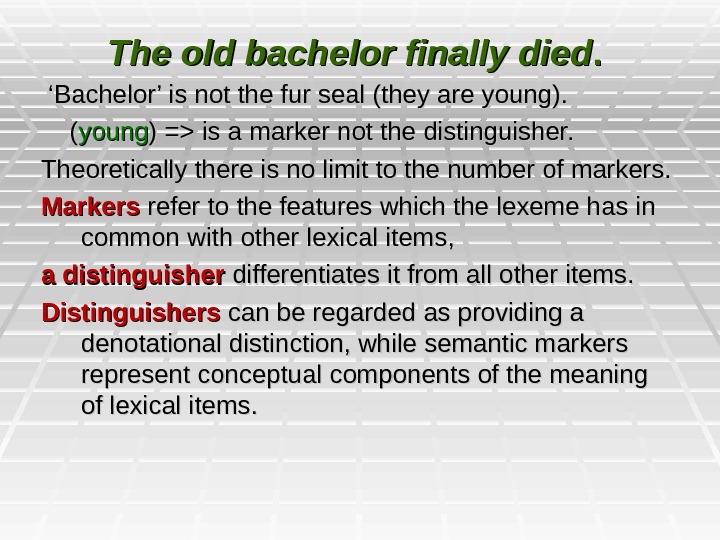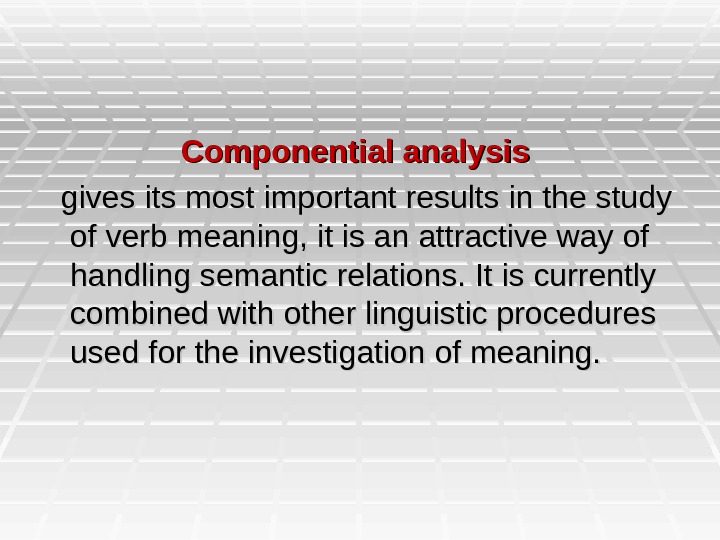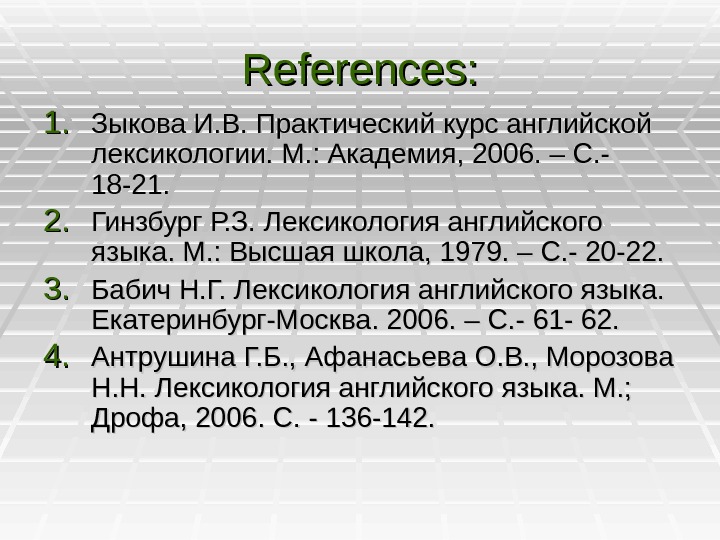There
are three classical theories of meaning:
-analytical
or referential
(F.de
Saussure’s disciples)
Meaning
is the relation between the object or phenomenon named and the name
itself;
-notional
or
conceptual (Aristotle,
John Locke, A.I. Smirnitskiy, etc.)
Meaning
is a certain representation
of an object / phenomenon / idea / relation in the mind;
—functional
or
contextual (L. Bloomfield)
Meaning
is the situation in which a word is uttered, i.e. its context.
22. Types and aspects of word meaning.
Aspects
of Meaning
-Objective
aspect (denotation): word ↔ referent;
-Notional
aspect, i.e. significant features common for classes of objects
(signification): word ↔ sense;
-Pragmatic
aspect, i.e. the speaker’s attitude to the referent (connotation);
-Systemic
or differential aspect, i.e. the relations of the signified word with
other words within a word-group or in speech.
Types
of meaning:
Word-meaning
is not homogeneous but is made up of various components the
combination and the interrelation of which determine to a great
extent the inner facet of the word.
Grammatical
meaning
is the meaning which unites words into big groups such as parts of
speech or lexico-grammatical classes. It is recurrent in identical
sets of individual forms of different words, e.g. stones,
apples, kids, thoughts have
the grammatical meaning of plurality.
Lexical
meaning
is the meaning proper to the word as a linguistic unit; it is
recurrent in all the forms of this word and in all the possible
distributions of these forms, e.g. the word-forms write,
writes,
wrote,
writing,
written
have different grammatical meanings of tense, person, aspect, but the
same lexical meaning ‘to make letters or other symbols on a
surface, especially with a pen or pencil’.
Components
of Lexical Meaning
Lexical
meaning is not homogenous either and may be analysed as including
denotative and connotative components.
Denotative
(denotational) (Lat. denotatum
‘signified’) component is the conceptual content of the word
fulfilling its significative and communicative functions; our
experience is conceptualised and classified in it.
Connotative
(connotational) (Lat. connoto
‘additional meaning’) component conveys the speaker’s attitude
to the social circumstances and the appropriate functional style,
one’s approval or disapproval of the object spoken of, the
speaker’s emotions, the degree of intensity; unlike
denotations or significations, connotations are optional.
Types
of Connotations
Stylistic
connotation
is concerned with the situation in which the word is uttered, the
social circumstances (formal, familiar), the social relationships
between the communicants (polite, rough etc.), the type and purpose
of communication, e.g. father
(stylistically neutr.), dad
(colloquial), parent
(bookish).
Emotional
connotation
is acquired by the word as a result of its frequent use in contexts
corresponding to emotional situations or because the referent
conceptualised in the denotative meaning is associated with certain
emotions, e.g. mother
(emotionally neutr.), mummy
(emotionally charged); bright
(emotionally
neutr.), garish
(implies negative emotions).
Evaluative
connotation
expresses approval or disapproval, e.g. modern
is often used appreciatively, newfangled
expresses disapproval.
Intensifying
connotation
expresses degree of intensity, e.g. the words magnificent,
gorgeous, splendid, superb
are used colloquially as terms of exaggeration.
Соседние файлы в предмете [НЕСОРТИРОВАННОЕ]
- #
- #
- #
- #
- #
- #
- #
- #
- #
- #
- #
-
#1
Hi,
I wonder if I can say:
I teach my students English
in all aspects
.
To mean «I teach my student written, spoken, reading, listening, etc».
Thanks a lot
-
#2
Sounds awkward to me, Silver. I teach my students all English language skills — reading, writing, listening, speaking.
-
#3
Sounds awkward to me, Silver. I teach my students all English language skills — reading, writing, listening, speaking.
Thanks a lot, I looked up the word in our forum and found that one of the meanings of it is «one particular part», so I guess my sentence, my phrase works. Would you please explain, Brother B?
-
#4
I agree with Boozer; his sentence is an improvement.
-
#5
I agree with Boozer; his sentence is an improvement.
Thanks a lot
Will this be better?
I teach my students all English language skills — reading, writing, listening, and speaking.
-
#6
«Aspects» in your original sentence could be confusing in this context — see definition #6 of our dictionary:
«Aspect — a grammatical category for verbs that indicates how long the action described is, whether it is repeating, if it is beginning, or if it has been completed»
As regards the use of the word aspects, you might say «I teach all aspects of economics» or «I teach economics in all its aspects.»
-
#7
It’s grammatically correct but slightly vague. I myself don’t have a problem with it but if you must improve it:«I teach my students English in all its aspects, (writing, speaking, reading, listening).»
If the fact you’re referring to the four skills is obvious, or if it has been aforementioned, what’s in the brackets can be, and often would be, dropped.
«Aspects» in your original sentence could be confusing in this context — see definition #6 of our dictionary:
«Aspect — a grammatical category for verbs that indicates how long the action described is, whether it is repeating, if it is beginning, or if it has been completed»
Most native speakers don’t know what verbal aspect is since it doesn’t really exist in English (English verbs don’t parse for aspect) and isn’t taught at school. Only linguists and students of Slavic or Semitic languages like Russian or Arabic, and others of interest, might know. It’s a technical word.
-
#8
Most native speakers don’t know what verbal aspect is since it doesn’t really exist in English (English verbs don’t parse for aspect)
This speaker of a Slavic language does not have the faintest idea what verb aspects his language has. He remembers being taught grammar at school but he never bothered to open his books.
However, he knows that English verbs can be marked for tense and aspect, in which case they often become verb phrases, e.g.
looked — past tense
was looking — past tense, progressive/continuous aspect
had looked — past tense, perfect aspect
had been looking — past tense, perfect and continuous aspect
This said, I agree that aspect is a technical term and unlikely to cause any great confusion.
-
#9
Agreeing with boozer: I wouldn’t normally associate «aspects» with English grammar, but I find «English
in all aspects»
quite an odd expression to use, so my mind went wandering off in that direction.
-
#10
Agreeing with boozer: I wouldn’t normally associate «aspects» with English grammar, but I find «English
in all aspects»
quite an odd expression to use, so my mind went wandering off in that direction.
I didn’t associate it with the grammar term, but «aspects» is a wide open word to use when you mean four specific things. My thoughts went to «how to use it at parties,» «how to give speeches,» etc. not reading, writing, listening, and speaking.
-
#11
However, he knows that English verbs can be marked for tense and aspect, in which case they often become verb phrases, e.g.
I never said that English verbs can’t be marked for aspect, I said English verbs don’t parse for aspect. In that, there’s a subtle yet meaningful difference.
Thank you for your agreement.
- Размер: 782 Кб
- Количество слайдов: 40
